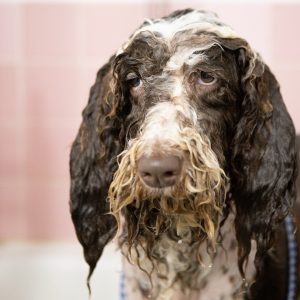Skunks are among the most widespread and common mammals in the United States, and the population is growing in most states. Skunks have adapted to live among people because of the abundance of shelter and food.
A skunk’s range is around four miles, but most skunks don’t travel more than a mile foraging at night. In urban and suburban settings, skunks do not have to walk as far to find food.
Skunks are opportunistic omnivores. Their diet includes consists of grubs, grasshoppers, bees, beetles, beetle larvae, and crickets. During the fall and winter, when food is scarce, skunks will scavenge for fruit, nuts, bird seed, and pet food. As a last resort, skunks will eat small mammals, including mice, rats, rabbits, and chicken eggs.
Skunks can find shelter in a variety of different places on your property. Their strong front feet have sharp claws that are perfect for digging. They can use wood or rock piles to create a den. Areas under your house like crawl spaces and porches are attractive skunk burrow locations.
The two most defining features of a skunk are its color and spray.
Are Skunks Dangerous?
The two most defining features of a skunk are its color and spray. The most common skunk in the United States is the striped skunk or spotted skunk. The smell of the skunk is notorious. The spray’s intensely pungent odor comes from thiol, a chemical compound mainly composed of sulfur and hydrogen.
The smell of the skunk spray is not the only concern.
-
Skunks are one of the main vector animals for rabies
-
Skunks can spread diseases like canine distemper, canine hepatitis, and leptospirosis
-
Skunks can introduce parasites like fleas and ticks
Are skunks dangerous to dogs and cats?
Skunks spray as a defense mechanism. Skunk spray has a very potent and displeasing smell. Because it consists of organic compounds containing sulfur, the spray has a very sulfurous smell. The spray’s intensely pungent odor comes from thiol, a chemical compound mainly composed of sulfur and hydrogen.
The spray can irritate your pet’s eyes, and if ingested, it is likely that your pet will become ill. Common side effects are vomiting and diarrhea. At the first sign of illness, it is best for your pet to see a vet.
If you always thought of a skunk attack as a smelly annoyance, think again. Skunk spray contains a variety of volatile oils that bind with an animal’s skin proteins, a combination that produces an even stronger stench when exposed to water. This spray can have some severe effects on your dog’s health.
Skunk Spray
Skunks can spray up to ten feet away and six times in succession. They can hit a pet in the face, eyes, nose, or mouth. Skunk spray can cause eye irritation and occasionally sight-threatening damage. Spray in the mouth may trigger drooling, nausea, and vomiting. Inhaling the spray may produce respiratory symptoms.
When to Take Your Dog to the Veterinarians after a Skunk Spry
Dogs sprayed by skunks need a veterinary evaluation to check for any serious side effects that might call for treatment. Your veterinarian may pay special attention to the state of your dog’s eyes, which can grow worse in the hours following a skunk attack.
Although very few dogs develop Heinz body formation from skunk attacks, your veterinarian may perform lab tests to check your pet’s blood count and evaluate its vital signs. If your dog seems at risk for the condition, it might need a blood transformation or other intravenous treatment.
Skunk Spray Remedies
Amazon and Petco sell Nature’s Miracle Skunk Odor Remover, which removes the skunk odor from pets, people, and clothing. Walmart sells De-Skunk Odor Destroyer Pet Shampoo, which breaks down the sulfur from the skunk oil and removes the odor from your cat or dog’s fur.
DIY Skunk Smell Removal
But, if you have liquid dish soap, baking soda, and 3% hydrogen peroxide, you can make your own de-skunk solution.
Mix
1 Quart of 3% hydrogen peroxide
¼ cup baking soda
1 tsp of liquid dish soap
Use gloves and thoroughly rub the formula on your pet’s coat to apply the solution. Next, rinse the formula, and then, use pet-friendly shampoo. Repeat these steps as needed.
Skunk Diseases
Introduce parasites like fleas and ticks to your family. Some of the most serious illnesses include leptospirosis, canine distemper, canine hepatitis, intestinal roundworm (Baylisascaris columnaris), and rabies.
Skunks and Rabies
Skunks are one of the primary carriers of rabies in North America (in addition to raccoons, foxes, and coyotes). In the north- or south-central states, skunks are the dominant rabies vectors.
Skunks do not have an aggressive predisposition, but if you have a skunk in your yard you should keep your pet’s rabies vaccination up to date.
Because skunks are nocturnal, skunks pose a greater danger to pets when it is dark outside. If you have a skunk problem, it is best to leash your pets after dusk to prevent any encounters until your skunk issue is resolved.
Skunk Control and Prevention
All in all, it is best to keep your yard free of skunks for the safety of your pets. If you have a current skunk issue, call a professional for help.
Trutech provides safe and humane skunk removal. Our process includes a thorough inspection, live trapping, and exclusion repairs depending on the situation. Since wildlife is wild, every situation is unique, and we provide solutions custom to your skunk situation, your home, and your concerns.



